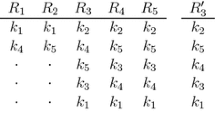Abstract
We present a compositional semantics for first-order logic with imperfect information that is equivalent to Sevenster and Sandu’s equilibrium semantics (under which the truth value of a sentence in a finite model is equal to the minimax value of its semantic game). Our semantics is a generalization of an earlier semantics developed by the first author that was based on behavioral strategies, rather than mixed strategies.
Similar content being viewed by others
References
Blass A., Gurevich Y.: Henkin quantifiers and complete problems. Annals of Pure and Applied Logic 32, 1–16 (1986)
Cintula, P., and O. Majer, Towards evaluation games for fuzzy logics, in O. Majer, A.-V. Pietarinen, and T. Tulenheimo, (eds.), Games: Unifying Logic, Language, and Philosophy, vol. 15 of Logic, Epistemology, and the Unity of Science, Springer, 2009, pp. 117–138.
Enderton H.B.: Finite partially-ordered quantifiers. Zeitschrift für Mathematische Logik und Grundlagen der Mathematik 16, 393–397 (1970)
Gale, D., and F.M. Stewart, Infinite games with perfect information, in H.W. Kuhn, and A.W. Tucker, (eds.), Contributions to the Theory of Games, vol. 2, Princeton University Press, Princeton, 1953, pp. 245–266.
Galliani, P., Game Values and Equilibria for Undetermined Sentences of Dependence Logic, MSc thesis, ILLC Publications, MoL-2008-08, 2008.
Henkin, L., Some remarks on infinitely long formulas, in Infinitistic Methods. Proc. Symposium on Foundations of Mathematics, Pergamon Press, Oxford, 1961, pp. 167–183.
Hintikka, J., Language-games for quantifiers, in Studies in Logical Theory, vol. 2 of American Philosophical Quarterly Monograph Series, Basil Blackwell, Oxford, 1968, pp. 46–72.
Hintikka J.: Quantifiers vs. quantification theory. Dialectica 27, 329–358 (1973)
Hintikka J.: The Principles of Mathematics Revisited. Cambridge University Press, Cambridge (1996)
Hintikka, J., and J. Kulas, The Game of Language: Studies in Game-Theoretical Semantics and Its Applications, D. Reidel Publishing Company, Dordrecht, 1983.
Hintikka, J., and G. Sandu, Informational independence as a semantic phenomenon, in J. E. Fenstad, I. T. Frolov, and R. Hilpinen, (eds.), Logic, Methodology and Philosophy of Science VIII, Elsevier, Amsterdam, 1989, pp. 571–589.
Hintikka, J., and G. Sandu, Game-theoretical semantics, in J. van Bethem, and A. ter Meulen, (eds.), Handbook of Logic and Language, Elsevier, Amsterdam, 1997, pp. 361–410.
Hodges W.: Compositional semantics for a language of imperfect information. Logic Journal of IGPL 5, 539–563 (1997)
Hodges, W., Some strange quantifiers, in J. Mycielski, G. Rozenberg, and A. Salomaa, (eds.), Structures in Logic and Computer Science: A Selection of Essays in Honor of A. Ehrenfeucht, no. 1261 in Lecture Notes in Computer Science, Springer, 1997, pp. 51–65.
Kuhn, H.W., Extensive games and the problem of information, in Contributions to the Theory of Games III, Princeton University Press, Princeton, 1953, pp. 193–216.
Mann, A.L., G. Sandu, and M. Sevenster, Independence-Friendly Logic: A Game- Theoretic Approach, no. 386 in London Mathematical Society Lecture Note Series, Cambridge University Press, Cambridge, 2011.
Peirce, C.S., Reasoning and the Logic of Things: The Cambridge Conferences Lectures of 1898, Harvard Historical Studies, Harvard University Press, Cambridge, Massachusetts, 1992.
Sevenster, M., Branches of Imperfect Information: Logic, Games, and Computation, Ph.D. thesis, Institute for Logic, Language and Computation, Universiteit van Amsterdam, 2006.
Sevenster M., Sandu G.: Equilibrium semantics of languages of imperfect information. Annals of Pure and Applied Logic, 161, 618–631 (2010)
Väänänen, J., Dependence Logic: A New Approach to Independence Friendly Logic, no. 70 in London Mathematical Society Student Texts, Cambridge University Press, Cambridge, 2007.
von Neumann J.: Zur Theorie der Gesellschaftsspiele. Mathematische Annalen 100, 295–320 (1928)
Walkoe, W.J., Jr., Finite partially-ordered quantification, Journal of Symbolic Logic 35:535–555, 1970.
Author information
Authors and Affiliations
Corresponding author
Rights and permissions
About this article
Cite this article
Galliani, P., Mann, A.L. Lottery Semantics: A Compositional Semantics for Probabilistic First-Order Logic with Imperfect Information. Stud Logica 101, 293–322 (2013). https://doi.org/10.1007/s11225-013-9475-6
Published:
Issue Date:
DOI: https://doi.org/10.1007/s11225-013-9475-6




